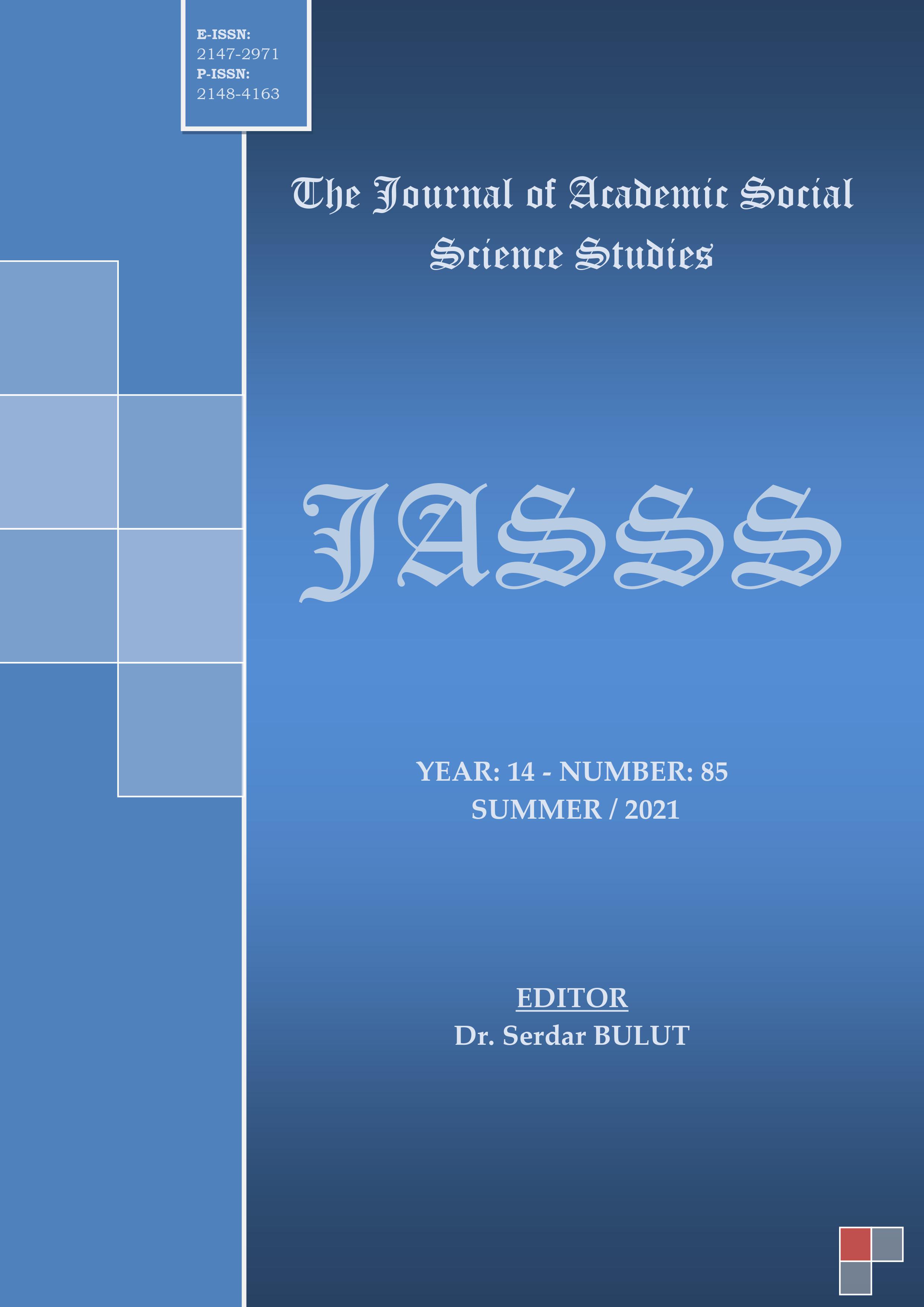Author :
Abstract
Covid-19 salgını 2020 yılı Mart ayının başlarından itibaren Türkiye’de de görülmeye başlanmış, tüm dünyada olduğu gibi sosyal yaşam ve iş yaşamının yanında, eğitim-öğretim hayatını da derinden etkilemiş ve birçok yükseköğretim kurumu uzaktan eğitime geçmiştir. Türkiye’de sanayinin ihtiyaç duyduğu, yeterli bilgi ve beceriye sahip nitelikli eleman yetiştirme misyonu endüstri meslek liseleri ile beraber meslek yüksekokullarına yüklenmiştir. Yükseköğretim temel göstergelerine göre Türkiye’de 2019-2020 eğitim-öğretim yılı itibariyle 907’si devlet, 112’si vakıf üniversitelerine bağlı olmak üzere 1019 meslek yüksekokulu bulunmakta, bu okullarda 22.391 öğretim elamanı görev alırken, 975.435 öğrenci de öğrenim görmektedir. Ülke sanayisinin ana insan gücünü yetiştirme noktasında kritik bir öneme sahip olan meslek yüksekokullarında verilen eğitimin kalitesi her zaman önemli bir tartışma konusu olmuştur. Salgın ile birlikte, meslek yüksekokullarında uzaktan eğitime geçilmesinin, uygulama ağırlıklı olan bu okulların eğitimini nasıl etkilediği sorusu doğmuştur. Salgınla beraber zorunlu olarak eğitimin uzaktan yapılıyor olması, öğrencilerin daha çok kendi kendilerine öğrenmek durumunda olmaları ve sınavların uzaktan yapılıyor olması, verilen eğitimin kalitesini daha da tartışmalı hale getirmiştir. Bu çalışmada, Covid-19 salgınıyla uzaktan eğitime geçen meslek yüksekokullarında, uzaktan eğitimin, verilen eğitimi nasıl etkilediği ve öğrencilerin örgün eğitime kıyasla uzaktan eğitime olan memnuniyetleri araştırılmıştır. Anket olarak hazırlanan çalışmada, çevrimiçi ve e-posta listesi örnekleme ile Kırıkkale Üniversitesi öğrencilerinden 193 öğrenci üzerinde yürütülmüştür. Bu amaçla 28 sorudan oluşan bir anket hazırlanmış ve Kırıkkale Meslek Yüksekokulu’nda eğitim gören öğrencilere uygulanmıştır. Genel olarak uzaktan eğitim ile birlikte, öğrencilerin eğitim öğretim masraflarındaki değişim, uzaktan eğitimden memnuniyetleri, uzaktan eğitim materyallerinin yeterliliği ve sınavlarla ilgili düşünceleri araştırılmıştır. Sonuçlara göre, en yüksek memnuniyet uzaktan eğitimde öğrencinin öğretici ile iletişiminde gerçekleşmiştir. En yüksek memnuniyetsizlik ise uygulamalı derslerin uzaktan eğitimi ile ilgili olmuştur.
Keywords
Abstract
Covid-19 pandemic has begun to affect the people in Turkey in the start of March and affected the public, educational and commercial life in Turkey as well as in the whole world. Because of pandemic, many higher education institutes decided to use distance educational methods. In Turkish educational system, vocational schools and vocational high schools are responsible for the training qualified persons for the industry. According to council of higher education, there are 1019 vocational schools, 907 of which are affiliated to state and 112 to private universities. Totally there are 22.391 lecturers, and 975.435 students are studying in these schools. The quality of the education in these schools is still a debate because of their high importance on commercial and industrial sectors. As a result of precautions against Covid-19 pandemic, vocational schools have also decided to use web based distance education methods. Distance education methods make practical trainings impossible which is crucial for vocational schools. It is a debate topic how the distance education affected the quality of the education in this schools. The aim of this study investigates on the effect of distance education on education quality and the satisfaction of the students. The survey with 28 questions was employed in the study, and it was carried out on 193 students studying at Kırıkkale University through e-mail sampling. In general, the changes in the educational expenditures, satisfaction with distance education, competences of the educational materials and the opinions of the students about the exams were investigated. According to the results, the highest contentment was about the communication of the students with the lecturer. The lowest pleasure was about the practical lessons in distance education.
Keywords
- 2018-2019 Bahar Dönemi (Yüz Yüze Sınav)
- 2019-2020 Bahar Dönemi (Uzaktan Sınav)
- Tablo-1: Kırıkkale MYO Kontrol Otomasyon Programı, 2018-2019 ve 2019-2020 Bahar Dönemleri Sayısal Tasarım Dersi Not Dağılımları Tartışma ve Öneriler Uzaktan eğitim, eğitim modelleri içerisinde en ideal model değildir. Ancak eğitime erişmekte
- çalışmalarda, benzer sonuçlar görülmüştür (Keskin and Özer Kaya, 2020). Öğrencilerin uzaktan
- Nitekim açık ders kaynakları ile MIT online olarak uzaktan eğitim yöntemiyle, 2001 yılında başlattığı
- Al, U. and Madran, R. O. (2004) ‘Web Tabanlı Uzaktan Eğitim Sistemleri: Sahip Olması Gereken Özellikler ve Standartlar’, Bilgi Dünyası, 5(2), pp. 259–271. Available at: http://www.openaccess.hacettepe.edu.tr:8080/xmlui/bitstream/handle/11655/9979/259271.pdf?sequence=1.
- Baş, H. (2020) Evde internet hızına doping. Available at: https://www.milliyet.com.tr/yazarlar/hanife- bas/evde-internet-hizina-doping-6305104 (Accessed: 10 October 2020).
- BBC (2020) ‘Koronavirüs: Ülkelerin okul stratejileri neler?’ Available at: https://www.bbc.com/turkce/haberler-dunya-53901681.
- CAN, E. (2020) ‘Coronavirüs (Covid-19) pandemisi ve pedagojik yansımaları: Türkiye’de açık ve uzaktan eğitim uygulamaları’, Açıköğretim Uygulamaları ve Araştırmaları Dergisi, 6(2), pp. 11–53. Available at: https://dergipark.org.tr/en/pub/auad/issue/55662/761354.
- Cumhur, A. and Ahıskalı, H. (2018) ‘İş Sağlığı ve Güvenliği Uygulamaları: Hitit Üniversitesi Örneği’, İş Sağlığı ve Güvenliği Uygulamaları: Hitit Üniversitesi Örneği, 7(2), pp. 310–319.
- Eygü, H. and Karaman, S. (2012) ‘Uzaktan Eğitim Öğrencilerinin Memnuniyet Algıları Üzerine Bir Araştırma’, 1(Ocak 2013), pp. 36–59. Available at: https://dergipark.org.tr/tr/download/articlefile/181058.
- İbicioğlu, H. and Antalyalı, Ö. L. (2005) ‘UZAKTAN EĞİTİMİN BAŞARISINDA İMKAN, ALGI, MOTİVASYON VE ETKİLEŞİM FAKTÖRLERİNİN ETKİLERİ: KARŞILAŞTIRMALI BİR UYGULAMA’, pp. 325–338. Available at: https://dergipark.org.tr/tr/download/article-file/50240.
- Karar Gazetesi (2020) ‘Harvard Üniversitesi gelecek yıl dersleri internetten yapacak’. Available at: https://www.karar.com/harvard-universitesi-gelecek-yil-dersleri-internetten-yapacak-1573216.
- Karasar, N. (2020) Bilimsel Araştırma Yöntemi: Kavramlar İlkeler Teknikler. Nobel Akademik Yayıncılık.
- Keskin, M. and Özer Kaya, D. (2020) ‘COVID-19 Sürecinde Öğrencilerin Web Tabanlı Uzaktan Eğitime Yönelik Geri Bildirimlerinin Değerlendirilmesi’, İzmir Katip Çelebi Üniversitesi Sağlık Bilimleri Fakültesi Dergisi, 5(2), pp. 59–67. Available at: https://dergipark.org.tr/tr/pub/ikcusbfd/issue/55773/754174%0Ahttps://dergipark.org.tr/en/pub/ ikcusbfd/issue/55773/754174.
- McDougall, K., Young, F. R. and Apan, A. (2003) ‘Operational infrastructure for quality distance and online geospatial programs’, Cartography, 32(1), pp. 25–38. doi: 10.1080/00690805.2003.9714232.
- seasia.co (2019). Available at: https://seasia.co/2019/07/12/rank-of-countries-with-fastest-and-slowest- internet-in-the-world-2019 (Accessed: 24 October 2020).
- Subaşı, M. and Okumuş, K. (2017) ‘Bir Araştırma Yöntemi Olarak Durum Çalışması’, Atatürk Üniversitesi Sosyal Bilimler Enstitüsü Dergisi, 21(2), pp. 419–426. Available at: https://dergipark.org.tr/en/download/article-file/474049.
- Suskind, D. (2015) Thirty Million Words. New York: Dutton, New York.
- Tarhan, N. (2020) Prof. Dr. Nevzat Tarhan: ‘65 Yaş Yasağı, Ölüme Yakınız Duygusu Ruhsal Travmayı Tetikleyebilir’. Available at: https://npistanbul.com/koronavirus/prof-dr-nevzat-tarhan-65-yasyasagi-olume-yakiniz-duygusu-ruhsal-travmayi-tetikleyebilir (Accessed: 11 October 2020).
- Toros, H. and Özkaynak, Ş. (2020) ‘koronavirus-onlemleri-hava-kirliligini-de-azaltiyor-477904 @ www.trthaber.com’. Available at: https://www.trthaber.com/haber/turkiye/koronavirusonlemleri-hava-kirliligini-de-azaltiyor-477904.html.
- Ulucak, Z. and Aytekin, E. (2020) ‘Güney Kore’de koronavirüs vakalarında artış’, Anadolu Ajansı, 5 February. Available at: https://www.aa.com.tr/tr/dunya/guney-korede-koronavirusvakalarinda-artis/1724913.
- www.speedtest.net (2020). Available at: https://www.speedtest.net/reports/tr/turkey/ (Accessed: 24
